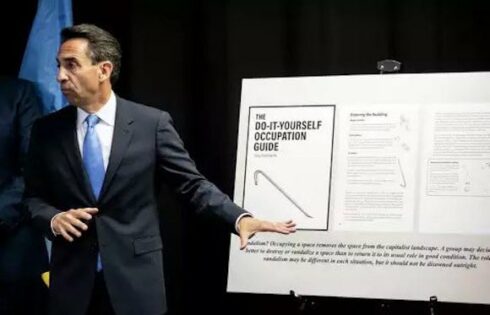“We reject oppressive speech codes, censorship, political correctness and every other attempt by the hard left to stop people from challenging ridiculous and dangerous ideas.”
This is how President Trump framed his planned executive order to protect campus free speech at the Conservative Political Action Conference, but it needs some work, according to a former Department of Education official who cut his teeth on campus free-speech fights.
Adam Kissel, long known among free-speech fighters for his years at the Foundation for Individual Rights in Education, served as Trump’s deputy assistant secretary for higher education programs a little over a year.
Though he doesn’t think that federal research grants to universities, much less the federal agencies that distribute them, should exist in the first place, Kissel provides an outline in National Review for Trump’s order to follow.
Though the research is for public benefit, the core value is the academic freedom of the researcher, which should be protected against “not only from outsiders [federal bureaucrats] but also from insiders [university administrators],” he says.
That means the only restriction on federal research grants that protects the researcher is “a condition that binds grantees to academic freedom,” whether at public or private institutions:
Academic freedom complements the First Amendment guarantees of free speech, press, religion, assembly, and petition. The best policy will expand the search for truth by preventing incursions on academic freedom.
Anything more than this will only worsen the ongoing problems with biased and politicized research, Kissel says:
For example, the National Science Foundation announced last year that it would leverage its grantmaking to fight sexual harassment on campus. Combined with the extremely well-documented kangaroo-court culture on campus, campus social pressure, and often feckless and spineless university administrators, what could go wrong?
He advises Trump that campus speech codes – which are prima facie unconstitutional at public universities, often violate free-speech promises at private universities, and threaten researchers as much as undergraduates – should be the primary target of its defunding threats.
The administration could wait for the federal courts to rule against universities with speech codes, on either constitutional or contractual grounds, and then impose penalties “from warnings to immediate cancellation and return of grants” based on the severity of the violation.
But an investigation could also be legitimately triggered by a researcher who alerts the federal agency that a speech code is “on the books,” Kissel says:
Why not also for a government policy or executive order requiring that even private institutions, at a minimum, uphold their own internal promises of free speech and academic freedom when executing federal-grant funds?
For those concerned about the “mission creep” of such rules on federal research grants, Kissel has far more confidence in the federal courts to “keep enforcing the Constitution regardless of what progressive critics often want it to say.”
Like The College Fix on Facebook / Follow us on Twitter




Add to the Discussion